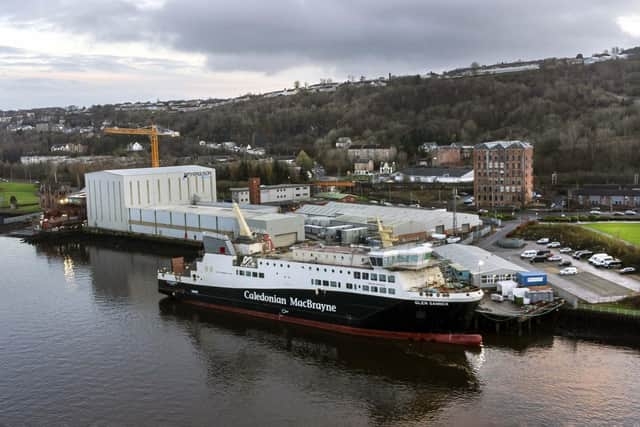Ferguson Marine ferries: Ferry bodies labelled BBC documentary 'purely sensationalist' as they attempted to shut down scrutiny
This article contains affiliate links. We may earn a small commission on items purchased through this article, but that does not affect our editorial judgement.
Internal emails disclosed to The Scotsman show how both CalMac and CMAL, alongside government agency Transport Scotland, collaborated to avoid senior figures answering questions about the ferries fiasco and the main allegations of the Disclosure documentary.
Publicly, CMAL said there was “no evidence” to support the allegation a multi-million ferry construction contract was rigged, but privately dismissed approaches for interviews as “sensational”.
Advertisement
Hide AdAdvertisement
Hide AdCritics said the emails were the “tip of the iceberg” around the ferries scandal and repeated demands for a public inquiry around the contract and construction of the two vessels.
The documentary, titled The Great Ferries Scandal, alleged the procurement for the two vessels had been “rigged” to favour the eventual winners of the contract, Port Glasgow-based Ferguson Marine.
Central to this allegation was how a technical specification paper, aspects of which were copy pasted for its bid, found its way into the hands of the shipyard, and why it was allowed to proceed in the process despite failing to offer a full builder’s refund guarantee.
The owner of the shipyard at the time, Jim McColl, was a close ally of the SNP and pro-independence movement and rescued the yard during the independence referendum campaign in 2014 after being contacted by then-First Minister, Alex Salmond.
Fergusons eventually entered administration and was nationalised by the Scottish Government in 2019, but both vessels, hulls 801 and 802 have been dogged by construction delays and are now six years late and several hundred million pounds over-budget.


The documentary led to fury from opposition politicians who accused the Scottish Government of “political corruption” and “corporate fraud”.
Emails show how CMAL, CalMac, and Transport Scotland all worked to minimise scrutiny of the issues raised by the documentary before it was aired.
They include chief executive of the ferry procurement body CMAL, Kevin Hobbs, share details with CalMac and the Scottish Government of separate approaches to two sources by the BBC journalist, Mark Daly.
Advertisement
Hide AdAdvertisement
Hide AdIn the email, he labels the intentions of the journalist as “looking for a sensational angle”.
Mr Hobbs was doorstepped by the BBC for the documentary, but refused to answer any questions.
CMAL’s PR agency, Clark Communications, was also in regular contact with CalMac and Transport Scotland around requests to interview Mr Hobbs.
An unnamed Transport Scotland official advises the agency to “hold off accepting this for now” due to “internal discussions at our end about the way forward”.
The documentary also sought to interview Erik Ostegaard, the chairman of David MacBrayne Ltd, CalMac’s parent company, and former CMAL chairman, who is one of the best informed individuals around the ferries fiasco.
In this email chain, CalMac’s external communications manager, Fiona Borland, confirms CalMac will decline the request from the BBC for an interview with Mr Ostergaard, stating “it seems to be purely sensationalist”.
Robbie Drummond, managing director at CalMac, in emails to his fellow directors, states there is “nothing in it for us” if Mr Ostergaard is interviewed.
He states: “The journalist is looking for sensationalism and will look to you for a critical quote or a contradiction.”
Advertisement
Hide AdAdvertisement
Hide AdLater, Mr Drummond advises Mr Ostegaard that CalMac had “agreed with TS [Transport Scotland] we would not participate” as part of advice following the doorstepping of Mr Hobbs.
Officially, the response to the BBC’s interview request was a “polite decline” due to the idea “the main focus will be on issues involving the Scottish Government and CMAL, rather than CalMac.”
Not one senior management figure from CalMac or CMAL answered questions on camera for the documentary.
CalMac also rejected a request for an interview from Good Morning Scotland, with Mr Drummond stating “we do not want to get involved”.
Graham Simpson, the Scottish Conservative transport spokesperson, said there remains “vital questions” to be answered on the ferries fiasco, but that the “culture of secrecy and deflection” includes Nicola Sturgeon and John Swinney.
He said: “This may be the tip of the iceberg when it comes to the dodgy dealings over these ferries, but it’s still disgraceful to see publicly-owned bodies closing ranks to avoid scrutiny in this way.
“It looks as though CMAL, CalMac and Transport Scotland may have deliberately co-ordinated with one another to dodge questions from investigative journalists at the BBC.
“They may have dismissed the documentary as ‘sensationalist’ but without it, the Scottish public might never have discovered the true extent of Ferguson’s preferential treatment.”
Advertisement
Hide AdAdvertisement
Hide Ad“The only way to get to the bottom of this scandal is for Ministers to agree to a full public inquiry.”
Scottish Labour’s transport spokesperson, Neil Bibby, said “openness and transparency, not secrecy and cover-up” was required.
He said: “The Scottish Government has created a culture where silence and the withholding of information has become the norm. It is increasingly clear that a public inquiry will be inevitable to get to the bottom of what has gone wrong here as we are still left asking basic questions with no answers.’
“Scottish ministers’ failure to provide full disclosure or initiate a public inquiry makes it look like they and their agencies have something to hide.”
A CalMac spokesperson said: “The Disclosure Scotland programme raised a number of serious questions and the emails quoted were sent three weeks prior to the programme being broadcast and the details contained within the programme being known.”
CMAL and the Scottish Government were also contacted for comment.
All episodes of the brand new limited series podcast, How to be an independent country: Scotland’s Choices, are out now.
It is available wherever you get your podcasts, including Apple Podcasts and Spotify.
Comments
Want to join the conversation? Please or to comment on this article.
